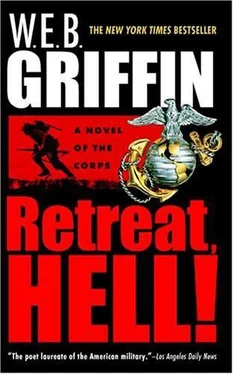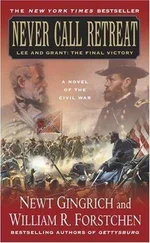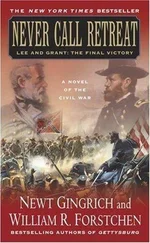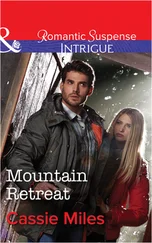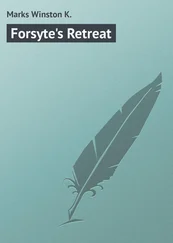The press could see the Bataan stop in front of the hangar, and a flight of mobile stairs being rolled up to it.
The first three people to debark from the Bataan were three Army photographers, two still and one motion picture. The photographers took up positions by the mobile stairway. Next off was Colonel Sidney Huff, the Supreme Commander's senior aide-de-camp.
He exchanged salutes with Major Alex Donald, USA, and Captain Howard C. Dunwood, USMCR, who were standing on the ground, looked around to see there were enough heavily armed Marines around so there wasn't much immediate danger to General MacArthur, and then raised his eyes to the open door of the Bataan and saluted.
The Supreme Commander somewhat regally descended the stairs and the cameras whirred and clicked. There was another exchange of salutes, then MacArthur was led to the just-open-wide-enough doors and went inside.
As soon as he had gone inside, preceded and trailed by the photographers, Brigadier General Fleming Pickering and Captain George F. Hart came down the stairs and went into the hangar.
Major Generals Ralph Howe and Edward C. Almond were standing inside the hangar. They saluted, then Almond stepped toward MacArthur for the benefit of the photographers. General Howe went to the door to avoid the photographers and also to see if Pickering had gotten off the airplane.
Pickering and Hart came into the hangar and stood with Howe as Major Alex Donald showed General MacArthur around the closest of the two helicopters. General MacArthur declined Major Donald's invitation to climb aboard the helicopter, but obligingly posed for several minutes while the photographers recorded the event for posterity.
Then he shook hands with Major Donald and walked back toward the door.
"General Howe," MacArthur declared, "I'm really glad to see you here."
"Good morning, sir."
"This business out of the way, I presume we can get on with returning President Rhee's capital to him," MacArthur said. "How are we going to do that, Sid?"
"Sir, I suggest that you reboard the Bataan," Colonel Huff replied, "which will then taxi to base operations, where the press is waiting."
"What about General Almond?" MacArthur asked.
"I would suggest that General Almond ride back over there in his car, sir. That would eliminate any possible questions about whether he has come to Korea with you."
"All right, Ned?" MacArthur asked.
"Yes, sir."
"I think it would be appropriate," Huff went on, "if General Almond were to greet the general when he descends from the Bataan."
"Yes, so do I," MacArthur said. "He is, after all, the liberator of Seoul." Then he added, jovially, "Well, then, Ned, why don't you saddle up, and hie thee to the other side of the airport?"
"Yes, sir," General Almond said. "You ready, Howe?"
"General," Howe said to MacArthur, "I'd like a moment of your time. Would it be all right if I rode over there with you?"
"I'd be delighted to have your company, General. Of course."
"Fleming," Howe said, "would you mind riding with General Almond?"
"Of course," Pickering said.
He, MacArthur, Almond, and Huff instantly decided that Howe had something to say to MacArthur that he didn't want anyone else to hear.
As Pickering, Hart, and Almond got into Almond's Chevrolet, MacArthur and Howe climbed the stairway to the Bataan. Colonel Huff and then the photographers followed them.
Pickering was a little curious about why Howe wanted a moment of El Supremo's time in private, but not concerned. Their relationship was not only one of mutual respect; they also liked each other. It never entered Pickering's mind that Howe was in any way going behind his back. He never had, and Pickering had no reason to suspect he would suddenly start now.
General Pickering was dead wrong. In this instance, Howe had something to say to the Supreme Commander that he absolutely did not want Pickering to know about.
"That will be all, Huff, thank you," MacArthur said, waited until Huff had closed the door, and then looked expectantly at Howe.
"General," Howe began carefully, "I fully understand that my role here is solely that of observer, and that I have neither the authority—and certainly not the expertise—to offer any sort of suggestion. . . ."
The Bataan began to taxi away from the hangar.
"General," MacArthur said, "I decide who has the expertise to offer a suggestion to me, and I would welcome any suggestion you might be good enough to offer."
"That's very gracious of you, sir," Howe said. "It's about those helicopters."
"Those helicopters?" MacArthur asked, surprised. "Or helicopters in general?"
"Those two helicopters, sir."
"Okay. Let's have it."
"While we were waiting for you to arrive, sir, Major Donald—the Army pilot in charge of them?"
MacArthur nodded.
"—gave General Almond and myself a well-thought-out briefing about those specific helicopters, and the future role of what he calls 'rotary-wing aircraft' in providing battlefield mobility."
"And you were, or were not, impressed?"
"May I speak frankly, sir?" Howe asked, and when MacArthur nodded, he went on, "Are you familiar with the phrase 'dog and pony show,' General?"
"I wouldn't be surprised if they used it at Valley Forge," MacArthur said.
"There are only five of those machines in the Army, General, according to Major Donald. Two are at the Army Aviation School at Fort Riley being studied, and the Air Force has a third, which they are subjecting to destructive engineering tests. In other words, the two here are the only two which are operational. I can't think of a place where they can be used for a really practical purpose, except perhaps to carry senior officers around, and neither can General Almond."
"So this is a dog and pony show?"
"I would suggest that it is, sir."
"In France, I staged more than one dog and pony show myself, to convince my seniors that a new gadget called the tank had a place in ground warfare."
Howe didn't reply directly.
"During Major Donald's enthusiastic presentation," Howe said, "I had two questions about the actual usefulness of these machines. The first thing, I thought, when he was telling us how useful they would be to transport senior officers, was that it would really be pretty stupid to load half a dozen generals or colonels on one of them. They are not immune to ground fire, and I don't know how safe they are, period."
MacArthur grunted.
"Same thing for carrying half a dozen wounded," Howe went on. "You don't often find half a dozen wounded in one place except in some place where what got them would also likely get a large, and fragile, helicopter."
"I hadn't thought about that," MacArthur said softly.
"They're capable of carrying six or seven infantrymen each. Say seven. But I can't think of a situation where fourteen men being flown into it would have much real effect."
"I take your point," MacArthur said. "So what is your suggestion? That I order these machines out of Korea? We can't really use them, and we shouldn't be wasting time and effort on a dog and pony show?"
"We haven't rescued Major Pickering, sir. Major McCoy told me he thinks he missed him on his last attempt by less than a couple of hours. Of course, he was riding in a jeep and weapons carrier convoy, and couldn't make very good time getting where he had to go."
"And McCoy could have flown in these machines to wherever he went in time to establish contact with young Pickering?"
"Possibly, sir. In fact, probably. With a dozen of his men, in case there was resistance when he got there."
MacArthur looked at Howe intently for a moment, and then glanced out the window.
Читать дальше
